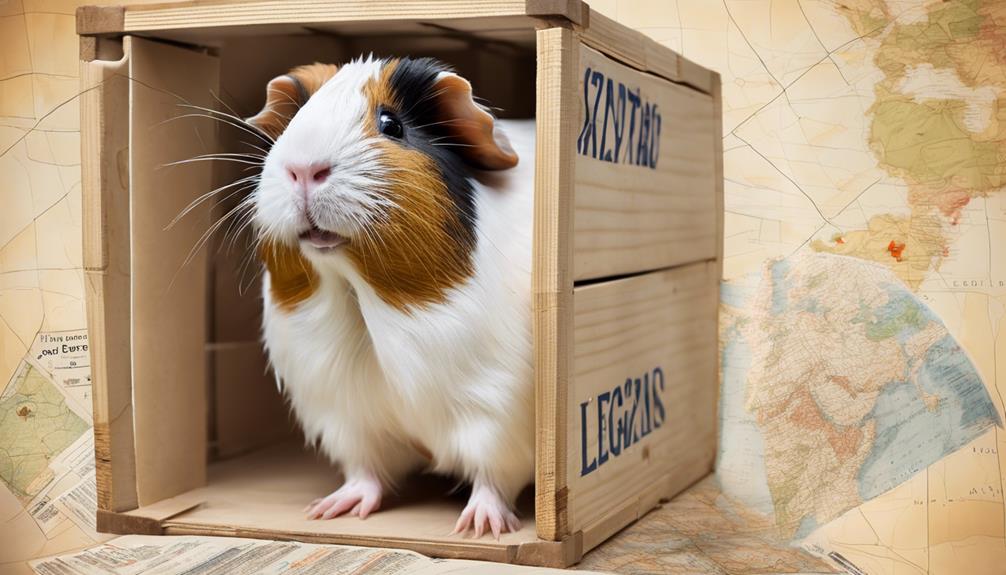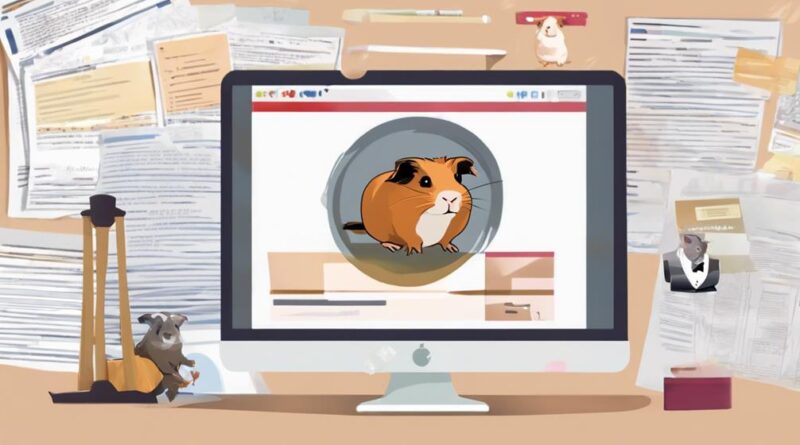Online Guinea Pig Sale: Navigating Legal Aspects
When it comes to selling guinea pigs online, you must tread carefully through the legal maze like a skilled navigator charting uncharted waters. From licensing requirements to health guarantee obligations, the journey of ensuring compliance can be complex.
As you embark on this venture, understanding the intricate legal aspects is crucial for safeguarding your business and the well-being of these adorable creatures.
Stay tuned to uncover essential insights that will help you steer clear of potential pitfalls and ensure a smooth sailing experience in the world of online guinea pig sales.
Licensing Requirements
To legally sell guinea pigs online, you must obtain the necessary licensing. This involves adhering to breeding restrictions set by your local authorities. Breeding restrictions aim to ensure responsible breeding practices and the welfare of the animals. Before obtaining a license, you'll need to go through an inspection process to verify that your facilities meet the required standards. This process typically involves ensuring proper housing, sanitation, and overall care for the guinea pigs.
Moreover, zoning regulations play a crucial role in the licensing requirements for selling guinea pigs online. It's essential to operate within areas zoned for such commercial activities. Zoning regulations are in place to prevent potential nuisances and conflicts with residential areas. Before starting your online guinea pig sales, make sure to check and comply with your local zoning laws to avoid any legal issues.
Additionally, record-keeping is a vital aspect of obtaining and maintaining the necessary licensing for selling guinea pigs online. Keeping detailed records of your breeding practices, sales, and veterinary care provided to the guinea pigs is crucial for accountability and transparency. These records may be subject to inspection during the licensing process, so it's essential to maintain accurate and up-to-date documentation to ensure compliance with regulations.
Animal Welfare Regulations
Adhering to animal welfare regulations is essential when selling guinea pigs online. Upholding breeding standards and ensuring ethical sourcing practices are crucial aspects to consider. When breeding guinea pigs for sale, it's important to prioritize the well-being of the animals. This involves providing adequate living conditions, proper nutrition, and regular veterinary care. Ethical sourcing emphasizes the need to obtain guinea pigs from reputable breeders or shelters rather than supporting unethical breeding practices.
To ensure compliance with animal welfare regulations, inspection protocols play a vital role. Regulatory authorities may conduct random inspections to assess the conditions in which the guinea pigs are bred and housed. These inspections help verify if the seller is meeting the required standards and regulations. It's essential to cooperate with inspectors and address any identified issues promptly to maintain compliance.
Enforcement measures are in place to address violations of animal welfare regulations. Failure to adhere to breeding standards or engage in unethical practices can result in penalties, fines, or even the suspension of selling privileges. By understanding and following these regulations, you demonstrate a commitment to the well-being of the guinea pigs and uphold ethical standards in your online sales.
Contractual Agreements With Buyers

When selling guinea pigs online, establishing clear contractual agreements with buyers is crucial to ensure a smooth transaction process. To navigate this aspect effectively, here are some key points to consider:
- Buyer Obligations:
- Clearly outline the responsibilities of the buyer in the contract. This may include payment terms, transportation arrangements, and the buyer's commitment to providing proper care for the guinea pig upon receipt.
- Specify any requirements for the buyer to adhere to local regulations regarding pet ownership, such as licensing or permit obligations.
- Include clauses that address what actions the buyer should take in case of any unforeseen circumstances or disputes that may arise post-sale.
- Seller Warranties:
- Disclose all relevant information about the guinea pig being sold, including health history, vaccination records, and any known behavioral traits.
- Guarantee the accuracy of the information provided to the best of your knowledge. This builds trust with the buyer and ensures transparency throughout the transaction.
- Offer warranties on the health and condition of the guinea pig for a specified period after the sale, protecting the buyer against any undisclosed issues that may arise.
Health Guarantee Obligations
Ensure your customers receive a clear and detailed health guarantee outlining the seller's obligations regarding the guinea pig's well-being post-sale. As a breeder, it's crucial to understand your responsibilities and the consumer rights associated with providing a comprehensive health warranty to offer buyer protection.
When crafting the health guarantee for your guinea pig sales, outline the specific breeder responsibilities. This should include details on the guinea pig's current health status, vaccinations received, and any potential genetic health issues that the buyer should be aware of. Clearly stating these points can help build trust with your customers and ensure transparency in the transaction.
Consumer rights play a significant role in the health guarantee obligations. Buyers have the right to receive a guinea pig that's in good health and free from any undisclosed illnesses or conditions. The health warranty should provide buyers with recourse in case the guinea pig falls ill shortly after the sale, ensuring that they're protected from unforeseen circumstances.
Compliance With Shipping Laws

To maintain ethical standards in your online guinea pig sales, it's essential to understand and adhere to shipping laws regarding the transportation of live animals. When shipping guinea pigs, especially internationally, there are specific regulations and requirements that must be followed to ensure the well-being of the animals and compliance with the law.
Here are three crucial points to consider when it comes to compliance with shipping laws:
- Customs Regulations: Different countries have varying customs regulations concerning the importation of live animals. It's imperative to research and understand these regulations before shipping guinea pigs internationally. Failure to comply with customs requirements can result in delays, fines, or even the rejection of the shipment.
- International Shipments: When sending guinea pigs abroad, you must be aware of the specific rules and restrictions governing the transportation of live animals across borders. This includes ensuring that the animals have the necessary health certifications, are transported in appropriate containers, and meet the entry requirements of the destination country.
- Documentation: Proper documentation is key when shipping guinea pigs, especially internationally. This may include health certificates, proof of vaccinations, and customs forms. Accurate and complete paperwork is essential to prevent any issues during transit and ensure a smooth customs clearance process at the destination.
Sales Tax Responsibilities
Understanding your obligations regarding sales tax is crucial for maintaining legal compliance in your online guinea pig sales. When operating in an online marketplace, taxation can be complex, but it's essential to ensure you're following the law. In the United States, sales tax requirements vary from state to state, so it's important to familiarize yourself with the specific regulations that apply to your business.
One aspect to consider is tax exemptions. Some states may offer exemptions for the sale of certain items, including live animals like guinea pigs. It's your responsibility to determine if any exemptions apply to your sales and to keep detailed records to support any exempt transactions.
Ensuring compliance with sales tax laws is vital to avoid potential penalties or legal issues. Make sure to register for a sales tax permit in each state where you have a sales tax obligation. Additionally, accurately collecting and remitting sales tax to the appropriate tax authorities is crucial for staying in good standing.
Keep in mind that sales tax regulations are subject to change, so staying informed about any updates or modifications to the laws is essential. By proactively managing your sales tax responsibilities, you can operate your online guinea pig sales with confidence and in accordance with legal requirements.
Handling Customer Complaints

Navigating customer complaints effectively can significantly impact the success of your online guinea pig sales. Customer satisfaction plays a crucial role in building a loyal customer base and positive reputation for your business. Here are three key steps to ensure a smooth resolution process for any customer complaints:
- Prompt Response: When a customer raises a concern, make sure to acknowledge it promptly. Responding in a timely manner shows that you value their feedback and are committed to addressing their issues. This can help prevent a minor problem from escalating into a larger one.
- Active Listening: Listen carefully to the customer's complaint and try to understand the root cause of their dissatisfaction. Empathize with their situation and show genuine concern for their experience. This demonstrates to the customer that their feelings are being acknowledged and taken seriously.
- Fair Resolution: Work with the customer to find a fair and satisfactory solution to their complaint. Whether it involves a refund, replacement, or another form of compensation, strive to resolve the issue in a way that leaves the customer feeling valued and respected. A positive resolution can turn a dissatisfied customer into a loyal advocate for your business.
Liability for Misrepresentation
Addressing liability for misrepresentation is crucial when conducting online guinea pig sales to protect both your business and customers. Making fraudulent claims or engaging in false advertising can have serious legal consequences. As a seller, you must ensure that all information provided about the guinea pigs you're selling is accurate and truthful.
Misrepresentation occurs when there's a false statement of fact that induces a party to enter into a contract. In the context of online guinea pig sales, this could involve misrepresenting the age, health, breed, or temperament of the animals. For example, claiming that a guinea pig is a certain breed when it's not, or stating that a guinea pig is healthy when it has an underlying medical condition, would constitute misrepresentation.
If a customer discovers that you have made fraudulent claims or engaged in false advertising, they may have legal grounds to seek remedies such as a refund, compensation for damages, or even pursue legal action against your business. This can damage your reputation, lead to financial losses, and result in regulatory penalties.
To avoid liability for misrepresentation, always ensure that your online listings are accurate and transparent. Provide clear and truthful information about the guinea pigs you're selling to build trust with your customers and maintain compliance with legal requirements.
Frequently Asked Questions
Can Online Guinea Pig Sales Be Subject to Specific Regulations Based on the Buyer's Location?
When buying online, your location can affect the regulations that apply. Depending on where you are, there may be specific restrictions on online sales. Be aware of any laws that could impact your purchase, especially when it comes to buying guinea pigs.
Ensure you understand the legal aspects of buying animals online to avoid any issues. Always check for regulations based on your location before making a purchase.
Are There Any Restrictions on Selling Certain Breeds or Types of Guinea Pigs Online?
When selling guinea pigs online, some restrictions may apply depending on the breed or type. Certain breeds could have limitations due to legal implications or regulations. Online marketplaces may have guidelines in place to adhere to these restrictions.
Additionally, buyer location restrictions might also impact the sale of specific breeds. It's important to be aware of any potential limitations when selling guinea pigs online to ensure compliance with laws and regulations.
How Can Sellers Ensure the Safe Transportation of Guinea Pigs to Their New Homes?
When it comes to ensuring the safe transportation of guinea pigs to their new homes, make sure you handle them carefully and securely.
Prior to the journey, schedule veterinary checkups to ensure their health and well-being.
Provide a comfortable and well-ventilated carrier for the guinea pigs during transit.
Avoid sudden movements or loud noises that may stress them out.
What Are the Recommended Best Practices for Advertising and Marketing Guinea Pigs for Sale Online?
When advertising guinea pigs online, focus on effective promotion to reach your targeted audience. Use high-quality photos and detailed descriptions to showcase your guinea pigs' unique traits. Highlight any special care they may need or their friendly personalities to attract the right buyers.
Utilize social media platforms, online classifieds, and guinea pig-specific forums to increase visibility. Building a positive reputation through good customer service can also help boost sales.
Are There Any Guidelines for Ensuring the Ethical Breeding and Selling of Guinea Pigs Online?
To ensure ethical breeding and responsible selling of guinea pigs online, prioritize the well-being of the animals. Consider genetic health, living conditions, and proper care.
Provide accurate information about the guinea pigs' background and ensure they go to suitable homes. Screen potential buyers to guarantee a good match.
Transparency in your breeding practices and a commitment to the animals' welfare are essential for ethical online sales.
Conclusion
Overall, when navigating the legal aspects of online guinea pig sales, it's crucial to ensure compliance with:
- Licensing requirements
- Animal welfare regulations
- Contractual agreements with buyers
- Health guarantee obligations
- Shipping laws
- Sales tax responsibilities
- Handling customer complaints
- Liability for misrepresentation
By staying informed and proactive in these areas, you can protect yourself and your business while providing a positive and ethical experience for your customers.
